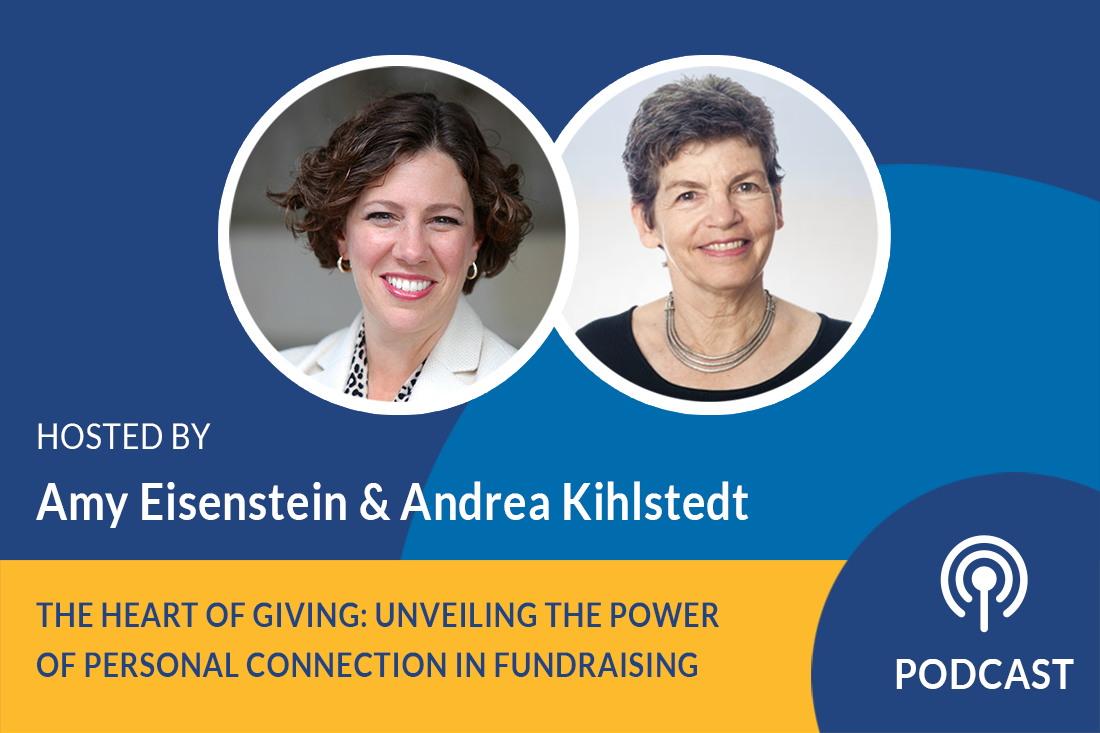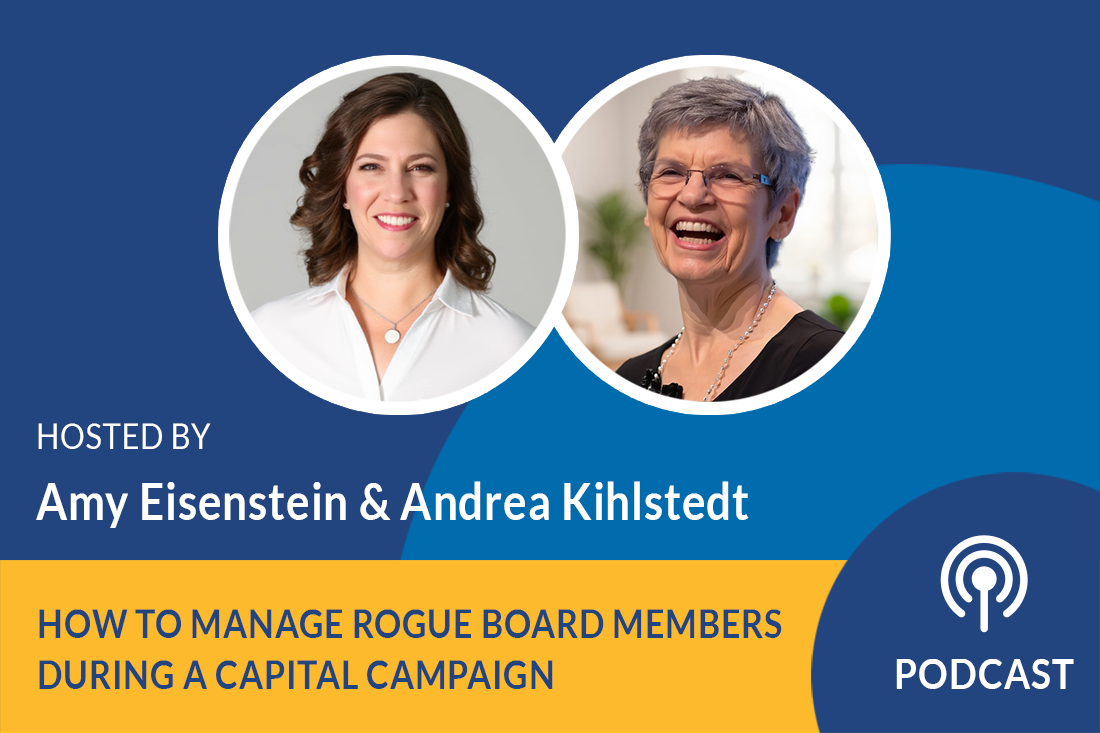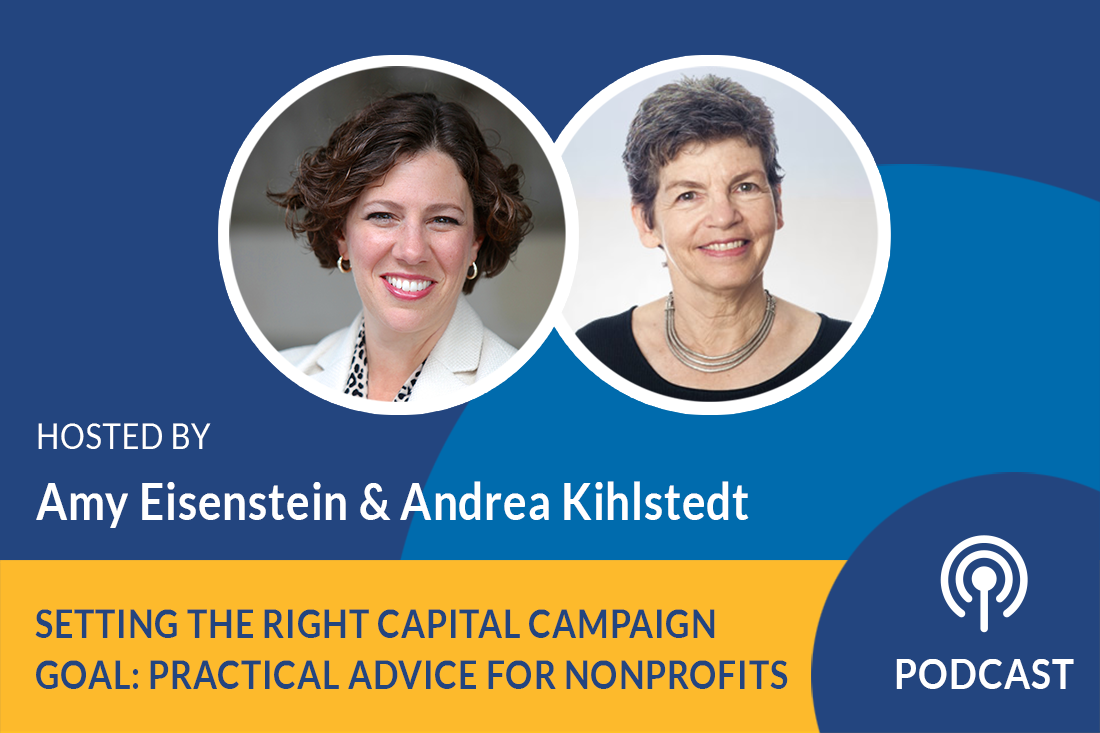Podcast: The Heart of Giving: Unveiling the Power of Personal Connection in Fundraising

Season 3, Episode 52
In this episode, join fundraising experts Andrea Kihlstedt and Amy Eisenstein as they dive deep into the essence of giving through personal stories and insights. Discover the profound impact of building genuine relationships with donors and learn how personal connections can transform the landscape of fundraising.
Together, they explore the surprising revelations of their own philanthropic actions, shedding light on the unexpected joy and fulfillment that come from giving more than once a year. Through these personal anecdotes and expert advice, this episode offers valuable lessons on engaging donors, expressing gratitude, and the importance of maintaining communication, especially during challenging times.
Listen Now:
Andrea Kihlstedt:
Today, we’re going to tell you about our giving, Amy’s giving, and my giving, and how it makes us feel. You may get some lessons from that.
Amy Eisenstein:
Hi, I’m Amy Eisenstein. I’m here with my colleague and co-founder, Andrea Kihlstedt. And today, we’re going to be talking about times that we’ve been asked for gifts and how it made us feel. And hopefully there are some lessons learned for you’re asking, and maybe you’re giving too.
How it Feels When You’re Asked for a Gift
Andrea, what’s a time that stands out for you? I mean, I know lots and lots of organizations ask you for gifts on a regular and ongoing basis in a variety of ways. Pick one to share.
Andrea Kihlstedt:
Yeah, let me start with one that actually just happened yesterday. So I give to a theater company here in New York. It’s an off-off Broadway company, but I’ve been a subscriber to them for nine years or 10 years. And every year, the same guy calls me up a couple of times a year. He calls me up to renew my subscription, and then he always asks me for a contribution. And I often do both of those things.
So yesterday he called me up and he essentially said, “Hi, Andrea.” He said:
“This year we’re having a tough time, and I’m hoping that you will… This, that, and the other thing has happened, this post-COVID, and I’m hoping that you’ll give a generous gift to help us get over this sort of difficult moment. We don’t want to lay people off, and really, I’m coming to ask you for some help, and I hope you’ll consider it.”
Personal Touches Matter When Building Relationships
And then he paused for a minute and he said:
“And by the way, how’s your husband?”
Now, here’s what’s interesting about this. I’ve never met this guy. I’ve talked to him on the phone for nine years, and he told me that nine years because I said to him, I said, “It’s so nice if you’d ask, my husband is fully recovered. He almost died. He’s fully recovered, and he’s getting ready to play tennis next month.”
And the fellow on the phone said, “Oh, he said, that just made my heart get happy.” And I thought to myself, “How neat is that that you can build a relationship? That he took the time to ask about my husband.”
That it meant something to him. And, of course, what did I say? I said, “Richard, I’d be happy to make that contribution.”
Amy Eisenstein:
Yes, you would.
Andrea Kihlstedt:
Yes, I would, right?
Amy Eisenstein:
Yes.
Andrea Kihlstedt:
It was so easy. And he also had my credit card on file, right? Because I renew his subscriptions. So he said, “I have your credit card. Can I just put it on that?” I said, “Yes.” And it was done. It was easy. There was no muss, no fuss. He knew who I was. He cared about me. He explained what he was asking for easily, but it wasn’t just about him and the theater.
Amy Eisenstein:
And so, I want to dig into it for just a minute. So in addition to being personal and understanding you, and remembering something important about you, you are an ongoing subscription donor —
Andrea Kihlstedt:
Yes.
Amy Eisenstein:
… and he was coming to ask you for a special gift over and above that-
Andrea Kihlstedt:
That’s right.
Amy Eisenstein:
… because of extenuating circumstances. And I think so many times nonprofit leaders are hesitant to do that, right? They don’t want to rock the boat. They’re afraid to even remind you, you’re a subscriber because you might cancel. And they certainly are, I’m generalizing here, of course, but are nervous to ask supporters, ongoing supporters, for special gifts. But who is more likely to make a special gift? Someone that already supports the organization or somebody who doesn’t?
Donor Loyalty Matters Too
Andrea Kihlstedt:
That’s right. I mean, had he called me out of the blue and I had never given to that organization, had I never gotten a subscription, I would’ve said, “I’m sorry for your troubles, but I’m not going to help you.”
The reality is that I feel a loyalty to this organization, even though I don’t like all their shows. It didn’t matter his last show. I just didn’t like it all, right, period. And I brought that up to him. He said, “Yeah, some people loved it, some people hated it.” He didn’t shy away from it. He didn’t make excuses. He didn’t… It was like, “Oh, you’re our supporter through thick and thin.”
More Stories of Donor Support
Amy Eisenstein:
Yes, I have the exact same story. I mean, I support one of the organizations that I support with my biggest gift is a food pantry, a soup kitchen. And I give to them regularly. I am a monthly subscriber also because I really believe in that. And a couple weeks ago, their hot water heater burst and flooded the kitchen, and it was a disaster.
And so, the executive director called me, and they sent out an emergency appeal, and I was delighted to help them. I mean, it made me feel great. And it was interesting, the executive director was a little hesitant. She said, “You don’t have to. You’re already a loyal supporter.” “Well, how are you going to feed the people if your kitchen’s flooded? Of course, I want to help.”
And I think the response she got from everybody was overwhelming. And it’s people that support them, and they want to know what’s going on.
As donors, I want to be involved. I want to know what’s happening. And so, I think this notion that you should not communicate or not bother, or not inconvenience is silly.
Andrea Kihlstedt:
Right. The other thing that’s, again, a recent experience for me is, this is March, and I’ve just pulled together all of our tax information. So I looked to see how much I gave last year, and honestly, I was surprised that I didn’t give away as much as I thought I had given away. That was interesting. And that was like, “All right, people didn’t ask me enough.” They didn’t have people… I could have given more.
Amy Eisenstein:
Oh, you’re going to get phone calls after this podcast.
Andrea Kihlstedt:
But usually it was like I would’ve been happy for someone to call and say, “Gee, here’s what’s going on. Would you like to support this?” And it’s easy to sit back and not to be sort of proactive or to sit back and just respond to an email now and again, or an end of year. It’s like –
“All right, end of year, you know you’re going to give end of year. Everybody asks and everybody gives.”
But I could give multiple times a year, and I wouldn’t mind giving if they actually called me and talked to me about what’s going on. And once I gave, I felt well thanked. I have one organization that every time I give them a gift of any substance, the executive director calls me within a few days, say:
“Hey, I just can’t tell you how much it means to us when I see your check come through. Thanks so much.”
That call makes all the difference. The next time they ask me, I’m there for them.
Amy Eisenstein:
Isn’t that so interesting? There’s been research and data about the power of a thank-you call after a gift out for more than a decade now. And so infrequently, I think so few charities have gotten good at that or gotten, yeah, I guess, gotten good at that. I mean, I make dozens of charitable contributions every year. They’re not huge, but they’re consistent.
I get almost no calls, which is so interesting. And I understand that for a big organization, I’m a very small fish, and they’re very big pond. But I give to some small organizations where I know, they know, and no calls. And listen, I don’t need to be coddled as a donor, particularly, but the data’s there. And as someone who teaches fundraising, it sort of breaks my heart that organizations could be doing a better job of just leaving a quick message. 99% of the time, people don’t pick up the phone. Just leave a thank-you message, and I think the fundraising will follow.
The Importance of Thanking Donors for Their Gifts
Andrea Kihlstedt:
Okay. Amy, let me ask you a question on the other side of the exchange. We’re talking about thanking people in stewardship. Let’s talk about the other side. In the last year, how many people have actually gotten in touch with you and asked you for a specific gift?
Amy Eisenstein:
That’s very few, right? Very few. I would say two, maybe two.
Andrea Kihlstedt:
Amy, that’s outrageous, right? That’s outrageous.
Amy Eisenstein:
And I give it to a dozen organizations.
Andrea Kihlstedt:
That’s outrageous. And if half of them called you and said, “Gee, would you consider making a special gift to do such and such like your food pantry?” Chances are you would’ve said yes. Chances are I would say yes if they called me up and said, “We’re having a such and such, and we could really use someone to sponsor the so-and-so.”
Amy Eisenstein:
That’s right.
Andrea Kihlstedt:
Am I going to say no? I’m not going to say no. I’m going to be happy they thought of me and feel good about the fact that I was on their radar.
Amy Eisenstein:
That’s right. That’s right. So interesting to think about the psychology of this and what’s going through people’s heads, and how just the fear. I think the fear stops so many fundraisers. I think call every single one of your recurring donors, every one of your loyal donors, and ask for an increase or a special gift. Come up with a solid case for support, and they will respond.
Andrea Kihlstedt:
Yeah. And when you’re doing that, don’t forget about them, right? You’ve been a donor to this organization for nine years now. I am always touched when a gift comes in from you, and I know this mission matters to you, “Here’s what’s going on, I wonder if you’d like to help us.”
So don’t just make it about your need. Also, make it about the relationship. Like, to go back to my initial example, the guy who, for some unknown reason, remembered that the last time he had called my husband, had been in the hospital. That’s amazing.
Amy Eisenstein:
And listen —
Andrea Kihlstedt:
How many people does he call? Lots.
Amy Eisenstein:
Yeah. And the truth is, he doesn’t have to remember that. He just has to have good notes in his database.
Andrea Kihlstedt:
Exactly.
Amy Eisenstein:
He doesn’t have to remember that —
Andrea Kihlstedt:
That’s exactly right.
Amy Eisenstein:
He just needs to look up your record.
Andrea Kihlstedt:
That’s right. That’s exactly right. But it felt to me like he remembered me.
Amy Eisenstein:
And that is exactly how it should feel, which is great.
Final Thoughts
Andrea Kihlstedt:
Yeah. So, I think, to wrap up, there are several things that, to me, are important. First of all, I don’t mind if someone asks me more than once a year. They can ask me two or three, or four times in a year if they’re asking me for things that I’m interested in. And that might be helpful to them, right? I’m likely to give several times a year, and I often don’t remember how many times I’ve given or how much.
Amy Eisenstein:
Well, and they should remind you, right? They should let you.
Andrea Kihlstedt:
Exactly.
Amy Eisenstein:
You’ve been a loyal donor —
Andrea Kihlstedt:
Exactly.
Amy Eisenstein:
… or we haven’t heard from you this year, and we miss you, and we’re hoping you’ll come back, whatever the case may be.
Andrea Kihlstedt:
Right. So don’t worry about calling someone more than once. Don’t let your loyal donors sit there without being called or without being contacted. Ask them. Amy and I, as you know, are in this fundraising business. The fact that people with organizations where we give regularly don’t ask us is silliness. They should ask us more. Neither one of us get asked.
Now, I’m not asking you who are listening to us to ask us, but the organizations we support regularly should have confidence that we will be perfectly fine if you call us and ask us for a special gift. That’s number two. And number three is, once someone has made a gift, once we make a gift, once the donor has made a gift, be sure that you follow up with a phone call, with a note, with a… Whatever feels comfortable. When you see your donor at a gathering, go up and say:
“Your gift really mattered this year. It just makes me feel good to know you’re there for us.”
Do it personally, right?
Amy Eisenstein:
Yeah. I want to add one thing. If they say no, don’t worry about it. Not now. Not now. Check in with them, say:
“Okay, I understand that now’s not a good time. Would it be okay if I came back in six months or when there’s another need?”
Don’t assume that not now means never. You’re going to get some no’s, and that’s okay. You can ask follow-up questions:
- Tell me more about that.
- How do you feel about your other support?
- Does this impact anything else?
- What’s going on? Tell me more.
I think just keep the conversation going, so don’t worry if you get a no.
Andrea Kihlstedt:
Yep. Amy, I think this is such an important conversation. We should think about things like this more often. We tend to talk about tactical things, what to do to get your campaign to work, but you and I are perfectly normal examples of how people function as donors. And I think everyone who listens should think about their own giving patterns and how they respond, and what works for them. And just be more cognizant.
Even talk to some of their board members. Have a conversation like this. What works for you? When have you wanted to give? When have you not wanted to give? Right? Have these conversations. It’ll be eye-opening, and it may give you more confidence to go out and ask.
Amy Eisenstein:
In fact, if you want to send us your stories, we would love to hear from you. So send us an email at amy@capitalcampaignpro.com or andrea@capitalcampaignpro.com. We would love to hear your experiences.
All right, thank you so much for listening, and we will see you next time.



Leave a Comment